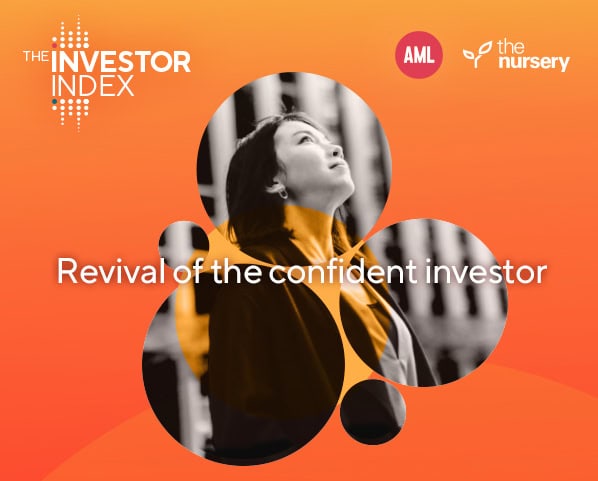AML x The Nursery
Investor Index 2024
The Investor Index is our annual study, alongside our friends at The Nursery, into the behaviours and attitudes of UK investors as they navigate and learn from the crises that continue to shape their approach to investing. Now, in our 5th year, investor confidence is at a high, greater than pre-pandemic levels, and investors are showing a revived optimism for the future.
Over the past few years of seemingly constant crisis, from the pandemic to war to cost-of-living, investors became increasingly self-reliant. They leant away from traditional advice in favour of doing their own research and making their own decisions. They focused on short-term returns and their own success, many choosing to de-prioritise the environmental and social impact of their investments in pursuit of perceived greater return.
Self-reliance remains
Last year’s burgeoning self-reliance grew again this year. More investors chose to do their own research, yet half of those investors also sought advice at some point, highlighting the dissolving binary between advised and unadvised. Along with the falling usage and expectations of robo-advice – and ‘AI advice’ still a far-off hope – it is clear there is space or even demand, especially among younger investors, for more flexible advice solutions without the prohibitive cost of traditional advice.
Investors back Britain
The British ISA was announced in the Spring 2024 budget as a new way to invest in UK companies; it also allows an additional £5k of tax-free investment to the £20k ISA allowance. The reaction of investors has been positive: 70% had heard of it and the vast majority say they would use it, particularly younger investors. Drivers of positivity are where we start to note generational differences. Younger investors are more likely to see a good investment opportunity, while older investors (over 65) are much more motivated by the ‘patriotic’ perspective that, ‘the British should invest in Britain’.
Election optimism
In the biggest year for global democracy, this generational divide is apparent in perceptions of the changing UK political landscape. 65% of investors believe that a change of political power will have a positive effect on their investments. But while younger investors are overwhelmingly positive, most older investors think a change in government (away from the Conservatives) will hurt their investments. Interestingly, despite young investors being most positive about the potential impact of such a change of government on their investments, they are the least likely to believe Labour will actually get the win. This highlights a disillusionment often identified in our younger cohort.
The future of AI investing
Younger investors were also pivotal in driving change and direction this year in their receptiveness to AI. Young investors are still far more likely to have used AI for financial advice, although the number of older investors trialling it has doubled compared to last year. In fact, across age groups, there is positivity around the future reliability of AI in advice with over 75% seeing its potential.
Summary
So, with self-reliance here to stay, investors putting more value on their own research and the number of asset classes and providers increasing, now is the time for providers to prioritise brand recognition and preference. They should strive to be a beacon of reason and understanding in a crowded environment.
Crucially this year, the younger segment has been a major driver of change and direction across the study. Their influence on the industry will only grow as ‘tomorrow’s’ investors become today’s. Providers should be increasingly aware of the need to invest ahead for what might initially be slim pickings from this younger cohort, or risk losing them to new channels and opportunities in future.


